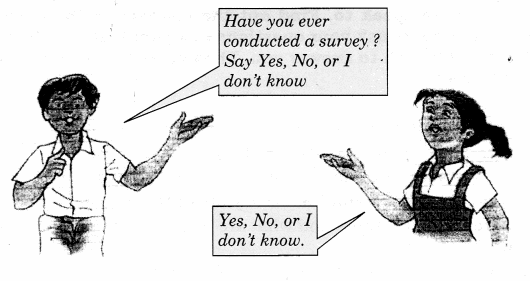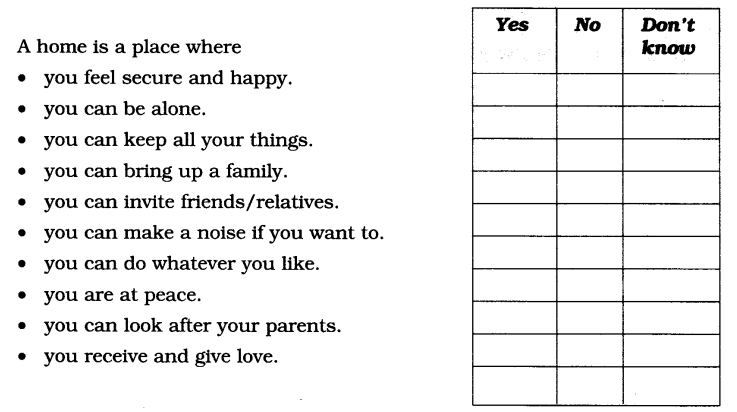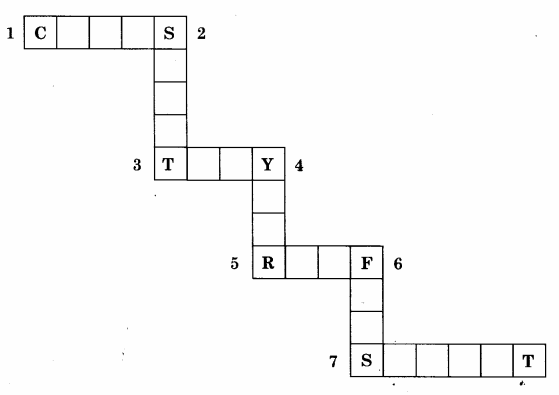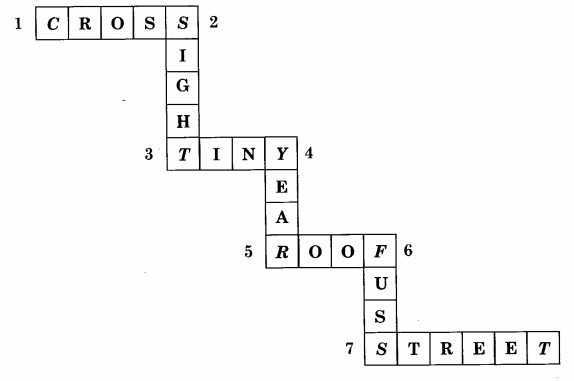NCERT Solutions for Class 7 English Honeycomb Chapter 6 Expert Detectives are part of NCERT Solutions for Class 7 English. Here we have given NCERT Solutions for Class 7 English Honeycomb Chapter 6 Expert Detectives.
| Board | CBSE |
| Textbook | NCERT |
| Class | Class 7 |
| Subject | English Honeycomb |
| Chapter | Chapter 6 |
| Chapter Name | Expert Detectives |
| Number of Questions Solved | 18 |
| Category | NCERT Solutions |
NCERT Solutions for Class 7 English Honeycomb Chapter 6 Expert Detectives
IMPORTANT PASSAGES FOR COMPREHENSION
Read the following extracts and answer the questions that follow by choosing the correct option :
I
Question 1.
“He must have lots of money hidden somewhere, maybe in that trunk in his room. It’s probably full of silver and gold and jewels and…”
Multiple Choice Questions
Question 1.
Maya’s opinion about Mr. Nath is
(a) that he has millions of rupees
(b) that he is poor
(c) that he is suffering from an incurable disease
(d) that he is a crook
Answer.
(a) that he has millions of rupees
Question 2.
The million of rupees are imagined to be hidden
(a) under the box
(b) in the trunk
(c) in the safe of his almirah
(d) in the big book
Answer.
(b) in the trunk
Question 3.
The author is speaking to
(a) Mother
(b) Ramesh
(c) Mr. Mehta
(d) Nishad Answers
Answer.
(d) Nishad
Question 2.
“Almost every Sunday, he carries two lunches to Mr Nath’s room and the
same man is with him each time. He’s tall, fair, stout and wears spectacles. Ramesh says his visitor talks a lot, unlike Mr. Nath who hardly speaks.” (Page 88)
Questions.
- Who carries two lunches ?
- Who is speaking to whom ?
- How can the information be useful ?
Answers.
- Ramesh
- Nishad is speaking to Maya
- The information can be useful to catch the crook
Question 3.
“Criminals can look quite ordinary. “Did you see the picture of the Hyderabadi housebreaker in the papers yesterday ? He looked like any man on the street.” (Page 88)
Multiple Choice Questions
Question 1.
Nishad could not believe Mr Nath to be
(a) a dacoit
(b) a police officer
(c) a crook
(d) a gangster
Answer.
(c) a crook
Question 2.
According to Nishad, an ordinary man
(a) cannot have lots of money
(b) cannot be clever
(c) cannot live alone
(d) cannot be a crook
Answer.
(d) cannot be a crook
Question 3.
Even the Hyderabadi house breaker was ……
(a) on the run
(b) an ordinary looking man
(c) a gangster
(d) very clever
Answer.
(b) an ordinary looking man
II
Question 4.
“If you insist on calling him a criminal, I don’t think I want to discuss any
thing with you, Maya.” Said Nishad angrily. “He can’t be such a bad man if he gives Ramesh such generous tips.” (Page 91)
Questions.
- Who is being called a criminal ?
- Why is Nishad angry ?
- What is Nishad’s opinion about the man ?
Answers.
- Mr. Nath is being called a criminal.
- Nishad is angry because Maya insists that Mr. Nath is a criminal.
- Nishad thinks that Mr. Nath is a very generous man.
Question 5.
“I don’t care,” said Nishad Stubbornly, “I like him and I’m going to try and be his friend.” (Page 92)
Multiple Choice Questions
Question 1.
The above statement shows Seven to be
(a) friendly
(b) stubborn
(c) fearless
(d) aggressive
Answer.
(b) stubborn
Question 2.
Nishad expressed his desire
(a) to listen to mother’s advice
(b) to consult Mr. Mehta
(c) to be friends with Mr. Nath
(d) to be friends with Ramesh
Answer.
(c) to be friends with Mr. Nath
Question 3.
After many warnings, Nishad still thinks Mr. Nath to be good. He is therefore
(a) a good friend
(b) an optimist
(c) a silent admirer
(d) a pessimist Answers
Answer.
(c) a silent admirer
TEXTUAL QUESTIONS
Comprehension Check (Page 89)
- What did Nishad give Mr Nath ? Why ?
- What is “strange” about Mr Nath’s Sundays ?
- Why did Nishad and Maya get a holiday ?
Answers.
- Nishad had been very upset about the weak looks of Mr Nath. He thought he was starving. So taking pity on Mr Nath, Nishad gave him a bar of chocolate.
- The strange thing about Mr Nath’s Sundays is a visitor. On every Sunday the same visitor comes to him. He is a talkative man. He does all the talking while Mr Nath hardly speaks. He is tall, fair, stout and wears spectacles.
- Nishad and Maya got an unexpected holiday from school. The school remained closed because of heavy rains on that day.
Working with the Text (Page 93)
Question 1.
What does Nishad find out about Mr Nath from Ramesh ? Arrange the information as suggested below :
• What he eats
• When he eats
• What he drinks, and when
• How he pays
Answer.
Nishad finds out from Ramesh that Mr Nath eats two meals a day-morning and evening. It’s always the same food-two chapattis, some dal and a vegetable.
Mr Nath drinks tea. He takes one cup of tea in the morning and one in the afternoon. He pays cash and tips well.
Question 2.
Why does Maya think Mr Nath is a crook ? Who does she say the Sunday visitor is ? (V. Imp.)
Answer.
Maya thinks Mr Nath is a crook for many reasons. Mr Nath has many scars on his face. She thinks that he got them during a shoot out or something like that. Mr Nath has no friends except a visitor who comes on Sunday. People around him also stared at him. He does nothing but pays cash for what he eats and drinks.
Maya thinks that his Sunday visitor is his accomplice in crime.
Question 3.
Does Nishad agree with Maya about Mr Nath ? How does he feel about him ? (Imp.)
Answer.
No. Nishad does not agree with Maya about Mr Nath. He feels that Mr Nishad is a poor, lonely man. He wants to be his friend and help him. He also considers him generous because he tips Ramesh well.
Working with Language
Question 1.
The word ‘tip’ has only three letters but many meanings. Match the word with its meanings below :
(i) finger tips – be about to say something
(ii) the tip of your nose – make the boat overturn
(iii) tip the water out of the bucket – the ends of one’s fingers
(iv) have something on the tip of – give a rupee to him, to thank him your tongue
(v) tip the boat over – empty a bucket by tilting it
(vi) tip him a rupee – the pointed end of your nose
(vii) the tip of the bat – if you take this advice
(viii) the police were tipped off – the bat lightly touched the ball
(ix) if you take my tip – the end of the bat
(x) the bat tipped the ball – the police were told, or warned
Answers.
- finger tips — the ends of one’s fingers.
- the tip of your nose — the pointed end of your nose.
- tip the water out of the bucket — empty a bucket by tilting it.
- have something on the tip of your tongue — be about to say something.
- tip the boat over — make the boat overturn.
- tip him a rupee — give a rupee to him to thank him.
- the tip of the bat — the end of bat.
- the police were tipped off — the police were told or warned.
- if you take my tip — if you take this advice
- the bat tipped the ball — the bat lightly touched the ball.
Question 2.
The words helper, companion, partner and accomplice have very similar mean
ings, but each word is typically used in certain phrases. Can you fill in the blanks below with the most commonly used words ? A dictionary may help you.
(i) business …………
(ii) my ……. on the journey.
(iii) I’m mother’s little …….
(iv) a faithful ……… such as a dog.
(v) the thief’s …….. .
(vi) find a good ……. .
(vii) tennis/golf/bridge …….. .
(vii) his …….. in his criminal activities.
Answers.
- partner
- companion
- helper
- companion
- accomplice
- helper
- partner
- accomplice
Question 3.
Now let us look at the uses of the word break. Match the word with its meanings below. Try to find at least three other ways in which to use the word.
(i) The storm broke – could not speak; was too sad to speak.
(ii) daybreak – this kind of weather ended.
(iii) His voice is beginning to break – it began or burst into activity.
(iv) Her voice broke and she cried – the beginning of daylight
(v) The heat wave broke – changing as he grows up
(vi) broke the bad news – end it by making the workers submit
(vii) break a strike – gently told someone the bad news
(viii) (Find your own expression. Give its meaning here.)
Answers.
- The storm broke — it began or burst into activity.
- daybreak — the beginning of daylight.
- His voice is beginning to break — changing as he grows up.
- Her voice broke and she cried — could not speak : was too sad to speak.
- The heat wave broke — this kind of weather ended.
- broke the bad news — gently told someone the bad news
- break a strike — end it by making the workers submit
- break the law — fail to obey a rule or law
- break a deadlock — end a situation in which no progress is being made
- break somebody’s spirit — destroy his confidence.
Speaking
Question 1.
Play detectives with each other. Find a person in your class (or some other
acquaintance) to speak to. Find out the answers to the questions given below. Be careful to ask your questions in a polite and inoffensive way. Do not force the person to answer you. Then allow the person to ask you the same questions.
(i)Name ?
(ii) What newspapers or magazines does the person read ?
(iii) How long has the person lived at the current address ?
(iv) What does she/he do during the day, le., the daily routine ?
(v) What do neighbours and friends say about the person ?
(vi) Who are his/her visitors and what are his/her eating habits ? (You can ask a few others about this.)
(vii) What do you think about the person ?
Answer.
Please try yourself.
Writing
Question 1.
Who do you think Mr Nath is ? Write a paragraph or two about him. (Imp.)
Answer.
It seems that Mr Nath is undergoing treatment of the scars. These scars on the face were caused by burning. Perhaps, he has to undergo some plastic surgery to get rid of the scars.
The scars have made him appear ugly. Perhaps, he looks a little frightening too. So people are not attracted towards him. They do not want to be his friend. Mr Nath understands his problem and so keeps aloof. He likes to meet only his doctor. However, he has a brother who comes to see him every Sunday.
Question 2.
What else do you think Nishad and Maya will find out about him ? How ? Will they ever be friends ? Think about these questions and write a paragraph or two to continue the story.
Answer.
Nishad and Maya are likely to find a few more ordinary facts about him. For example, they may find that Mr Nath has many books in his trunk. He might be spending most of his time in reading or doing some yogic exercises. Nishad will find that his efforts to try to be Mr Nath’s friend will not meet with much success. Maya will find that Mr Nath is very reserved. This will only confirm her belief that he is a crook.
The problem between the two children will be resolved only by their mother. One day she will tell them that Mr Nath is mentally depressed. She will introduce the two children to him. Then of course, they will be friends again.
Question 3.
Conducting a Survey

Step I : Study the following questionnaire and discuss the points in small groups.

Step II : Collect information. Contact people in the school/your locality and put these questions to them. Tick-mark their answers in the relevant column.
Step III : Analyse the results in the group by asking
• How many people think that a home is a place where you feel secure and happy ?
• How many people think that a home isn’t a place where you feel secure and happy ?
• How many people don’t know about it?
Step IV : Present a brief oral report on the result of your survey. Use phrases such as the following
• Most people think that …
• Few people think that …
• Hardly anyone thinks that …
• No one thinks that …
Answer.
Please attempt yourself.
We hope the NCERT Solutions for Class 7 English Honeycomb Chapter 6 Expert Detectives help you. If you have any query regarding NCERT Solutions for Class 7 English Honeycomb Chapter 6 Expert Detectives, drop a comment below and we will get back to you at the earliest.



